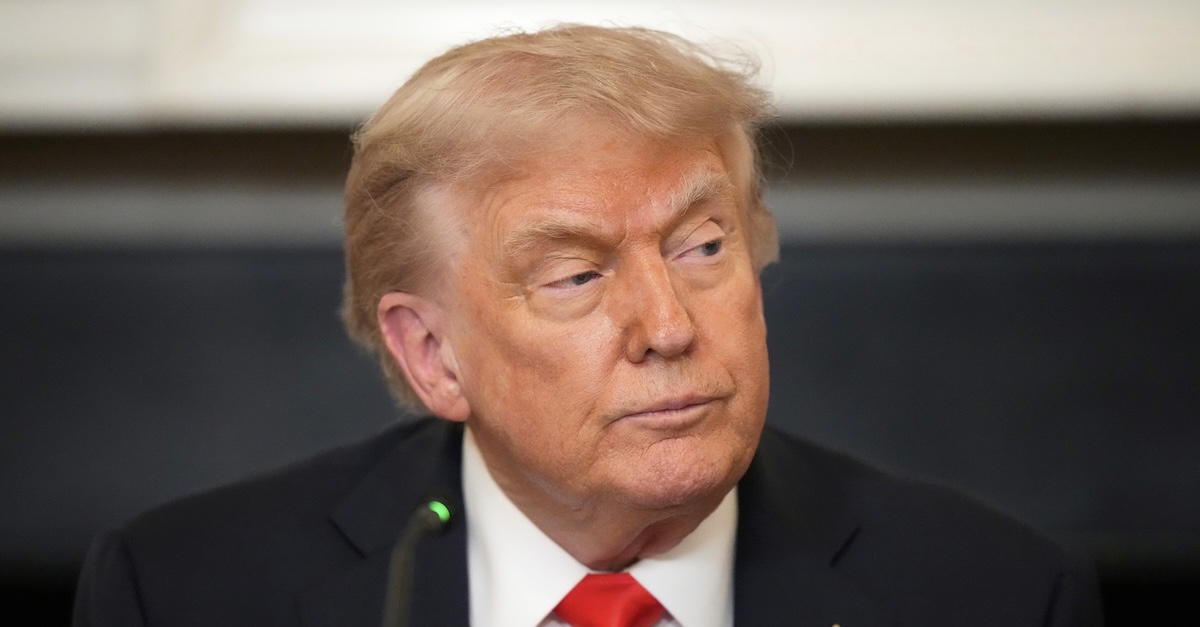
President Donald Trump attends a meeting with the Fraternal Order of Police in the State Dinning Room of the White House, Thursday, June 5, 2025, in Washington (AP Photo/Alex Brandon).
A federal judge in Texas blocked the Trump administration from summarily deporting migrants in the state under a rarely-used 18th-century wartime power with little or no due process, becoming the latest in a growing line of jurists to hold that President Donald Trump’s invocation of the Alien Enemies Act (AEA) was unlawful.
U.S. District Judge David Briones on Monday granted a request for a permanent injunction barring the government from removing Venezuelan migrants accused of being members of the Tren de Aragua (TdA) gang to the notorious CECOT terrorist prison in El Salvador.
In a 56-page order, Briones wrote that Trump’s proclamation was “hereby declared unlawful,” reasoning that the administration’s implementation of the executive order was “inconsistent with the AEA” and its statutory requirements.
“Under the AEA, a president cannot unilaterally define what constitutes an invasion, summarily declare that a foreign nation or government has threatened or perpetrated an invasion or predatory incursion of the United States, identify alien enemies subject to detention or removal, and summarily remove them,” the judge wrote.
Love true crime? Sign up for our newsletter, The Law&Crime Docket, to get the latest real-life crime stories delivered right to your inbox.
Trump on March 15 became the first president since World War II to invoke the AEA, which authorizes him to summarily remove “natives, citizens, denizens, or subjects” of a “hostile nation or government” when there is “declared war” against it or when it has “perpetrated, attempted, or threatened against the territory of the United States” an “invasion or predatory incursion.” In a controversial and novel use of the power, Trump declared the Venezuelan gang Tren de Aragua (TdA) had committed or attempted an “invasion” or “predatory incursion” such that any member of the group was summarily removable under the Act.
The administration asserted that the gang constituted a “hybrid criminal state” for purposes of invoking the AEA.
The court rejected the administration’s interpretation of the AEA and emphasized that proper invocation of the power requires an executive order that includes “sufficient factual statements” and other references enabling courts to “determine whether the conduct and events satisfy the conditions that support the invocation of the statute.”
“This Court need not look beyond the four corners of [the president’s Proclamation] to find its severe deficiencies in comporting with the AEA,” Briones wrote. “Even accepting every assertion in [the Proclamation] as true, it does not rise to meet the plain, ordinary meanings of the statutory terms.”
Following a brief overview on interpreting the language of a centuries-old statute, Briones explained that the terms “invasion” and “predatory incursion,” as used in the statute, require a “militarized effort against, and militarized intrusion into, the territory of the United States with the specific purpose of conquering or obtaining control over territory.” The alleged actions of TdA, according to the judge, were well outside the definitions of those terms.
This Court also rejected the administration’s request to “broaden the meaning of these terms” in light of modern warfare tactics, with Briones writing that doing so would effectively render the AEA “irrelevant.”
“The AEA was clearly not meant to be all-encompassing,” he wrote. “As such, this Court declines to stretch the AEA’s meaning so broadly that mass migration or criminal activities by some members of a particular nationality could qualify as an ‘invasion,’ and virtually any group, hailing from virtually any country, could be deemed alien enemies.”
Briones’ analysis cited heavily to the order of another federal judge in Texas — Trump-appointed U.S. District Judge Fernando Rodriguez — who in April similarly found that the administration’s use of the AEA was illegal.
“The court properly recognized that the Alien Enemies Act is a wartime measure that cannot be used during peacetime, much less without due process, to send people to a gulag-type prison in El Salvador,” Lee Gelernt, the deputy director of the ACLU’s Immigrants’ Rights Project and the lead attorney in the case, said in a statement to local news nonprofit El Paso Matters.












